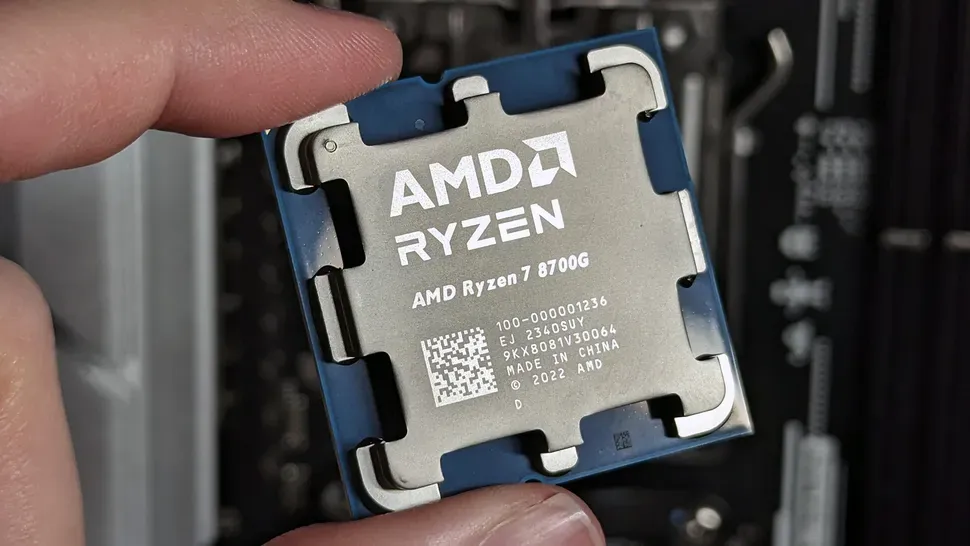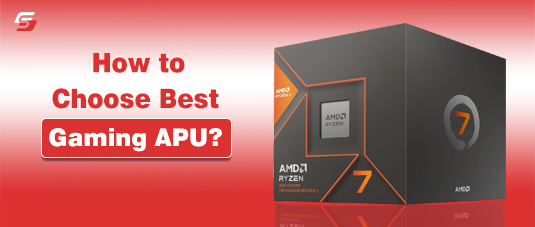Think about building a gaming PC without spending hundreds of dollars on a graphics card yet still being able to play your favorite titles smoothly. That’s the magic of a gaming APU, a single chip that combines a processor and a graphics unit in one package.
The real challenge comes when you try to pick the best gaming APU. The one that can be your best pick because specifications, marketing claims, and endless benchmarks can quickly get overwhelming. I want to make this easier for you.
Together, we will explore the key factors that truly matter so you can confidently choose the best gaming APU.
What is a Gaming APU?
A gaming APU, or Accelerated Processing Unit, is a processor that combines both a central processing unit (CPU) and a graphics processing unit (GPU) on a single chip.
As compared to traditional processors that rely on a separate graphics card, a gaming APU delivers built-in graphics performance, and makes it a cost-effective option for gamers who want to play online games without investing in dedicated GPUs.
Modern APUs, particularly from AMD’s Ryzen G series, are capable of running popular esports and casual titles at 720p or even 1080p with decent frame rates. This makes them ideal for budget-friendly gaming PCs and compact builds.

How to Choose the Best Gaming APU?
In the under section, I have mentioned some points that will highlight the key elements you have to consider when it comes to picking the best gaming APU.
1. Performance Always Comes First
When it comes to gaming, performance should always be your top priority. APU performance depends on both the CPU cores and the integrated GPU. If either side is weak, the overall experience suffers.
- CPU Cores and Threads: The number of cores and threads in an APU decides how many tasks it can handle at once. Games today demand at least 4 to 6 cores for smooth performance, but if you want to be future-proof, look for 8 cores. More threads also help in multitasking and background processes.
- Clock Speeds: Clock speed measures how fast the processor runs. Higher base and boost clock speeds generally mean smoother performance in games. Always check both base and boost speeds before buying.
- Integrated GPU Strength: The GPU inside the APU is the heart of gaming performance. AMD’s Radeon Vega integrated graphics, for example, are known for delivering a good gaming experience at 720p and even 1080p in less demanding titles.
2. Compatibility With Your Setup
Before rushing to buy a gaming APU, make sure it fits perfectly into your existing gaming system. Compatibility issues can ruin the whole build.
- Motherboard Chipset Support: Not every motherboard supports every APU. Check if your motherboard has the correct socket and chipset. For instance, most AMD APUs use the AM4 socket.
- BIOS Updates: Sometimes, an older motherboard may need a BIOS update to support the latest APUs. Always confirm this with the manufacturer before installing.
- RAM Support: Integrated GPUs rely heavily on system RAM, so you need to confirm that your motherboard supports fast memory speeds. Otherwise, you may face performance bottlenecks.
3. Memory Speed Matters More Than You Think
APUs are different from CPUs because their graphics unit uses your system RAM as video memory. That means RAM speed has a direct impact on gaming performance.
- Dual-Channel Setup: Always use dual-channel memory instead of a single stick. It doubles memory bandwidth, which the GPU inside the APU needs to perform well.
- Recommended Speeds: Look for at least DDR4 RAM with 3000 MHz or higher. The faster the RAM, the smoother your gaming experience will be.
- Future RAM Upgrades: Make sure your motherboard has enough slots for future memory expansion. Gaming gets more demanding every year, so having room for upgrades is crucial.
4. Resolution and Graphics Settings You Expect
You need to set realistic expectations when buying an APU. It is not a replacement for a high-end gaming PC with a dedicated graphics card, but it can deliver solid performance at the right settings.
- 720p Gaming: If you are happy playing at 720p with medium settings, even budget APUs will give you good performance in most titles.
- 1080p Gaming: For 1080p gaming, go for stronger APUs like the AMD Ryzen 5 5600G or Ryzen 7 5700G. These can handle modern games at medium to high settings.
- Esports Titles: Games like CS:GO, Valorant, and League of Legends are less demanding and run smoothly even on entry-level APUs. If these are your primary games, you can save money by not buying the most powerful APU.
5. Budget and Value for Money
Price always plays a role in your decision. You need to balance your budget with the level of performance you want.
- Entry-Level APUs: If you are a casual gamer or someone building a budget PC, entry-level APUs like AMD Athlon or lower-end Ryzen G series can serve you well.
- Mid-Range APUs: Mid-range APUs give you the best balance between cost and performance. They are strong enough for 1080p gaming and light multitasking.
- High-End APUs: If you want to push the limits of integrated graphics, high-end APUs are the way to go. They cost more but also give you headroom for better settings and smoother frame rates.
6. Power Consumption and Cooling Needs
Gaming APUs generate heat just like CPUs and GPUs. If you ignore power and cooling, you may face throttling and reduced performance.
- TDP Ratings: Always check the TDP (Thermal Design Power) of the APU. It gives you an idea of how much power it consumes and how much cooling it requires.
- Stock Coolers: Many APUs come with stock coolers like AMD’s Wraith series. While these are decent for normal use, consider an aftermarket cooler if you plan on heavy gaming sessions.
- Case Airflow: Even the best cooler won’t help if your case has poor airflow. Make sure your system has proper ventilation for stable performance.
7. Upgradability and Future-Proofing
Your gaming PC should not just serve you for today but also stay relevant for a few years. Choosing an APU with an upgrade path can save you from spending too much in the long run.
- Adding a Dedicated GPU Later: One of the biggest advantages of APUs is that you can add a dedicated graphics card later. Look for APUs that pair well with mid-range GPUs in the future.
- Future CPU Upgrades: Make sure the motherboard you buy can also support higher-end CPUs. This way, you can swap your APU for a dedicated CPU if you upgrade later.
- Longevity of Socket Support: Brands like AMD usually support the same socket for multiple generations. This makes upgrading easier and cheaper.
8. Brand Reliability and Driver Support
Even the best hardware is useless without stable software support. Driver updates can improve performance and compatibility over time.
- AMD APUs: Currently, AMD dominates the APU market with its Ryzen G series. They offer regular driver updates, and ensure better performance with new games.
- Intel APUs: Intel’s integrated graphics have improved over the years, but they still lag behind AMD in raw gaming performance. However, they are reliable for casual gaming and multitasking.
- Driver Updates: Always check how often the manufacturer provides graphics driver updates. Regular updates mean you won’t miss out on optimizations for new games.
9. Real-World Benchmarks and Reviews
Specifications on paper can be misleading. That’s why you should always check benchmarks and user reviews before buying. And I am really not saying this about APUs only. You have to do the same even when purchasing accessories, like mouse, keyboard, and gaming headphones.
- Gaming Benchmarks: Look for benchmarks that test your favorite games. Some APUs perform better in specific genres than others.
- Productivity Tests: If you plan to use your APU for more than gaming, such as video editing or streaming, check productivity benchmarks as well.
- Community Feedback: Forums and YouTube reviews are a goldmine of information. Real users often reveal issues you won’t find in official specifications.
10. Availability and Market Trends
Finally, the availability of an APU can affect your choice. Prices fluctuate, and certain models may be hard to find depending on your region.
- Stock Issues: Some of the best APUs sell out quickly. Always check availability before finalizing your choice.
- Price Drops: APUs often see price drops when new models launch. If you are not in a hurry, waiting a few months can save you money.
- Regional Pricing: Prices vary by region, so what looks like a bargain in one country may be expensive in another. Always compare across multiple stores.
Final Thoughts
These are the details about how to choose the best gaming APU.
Choosing the best gaming APU comes down to balancing performance, budget, and future needs. You need to look at everything from CPU cores and GPU performance to RAM speed, compatibility, and cooling.
I always recommend setting realistic expectations before making a purchase because APUs are designed to give you solid performance without breaking the bank, not to replace high-end dedicated graphics.
When you carefully consider the 10 factors I have shared, you will be able to pick an APU that perfectly matches your gaming needs and upgrade path.










